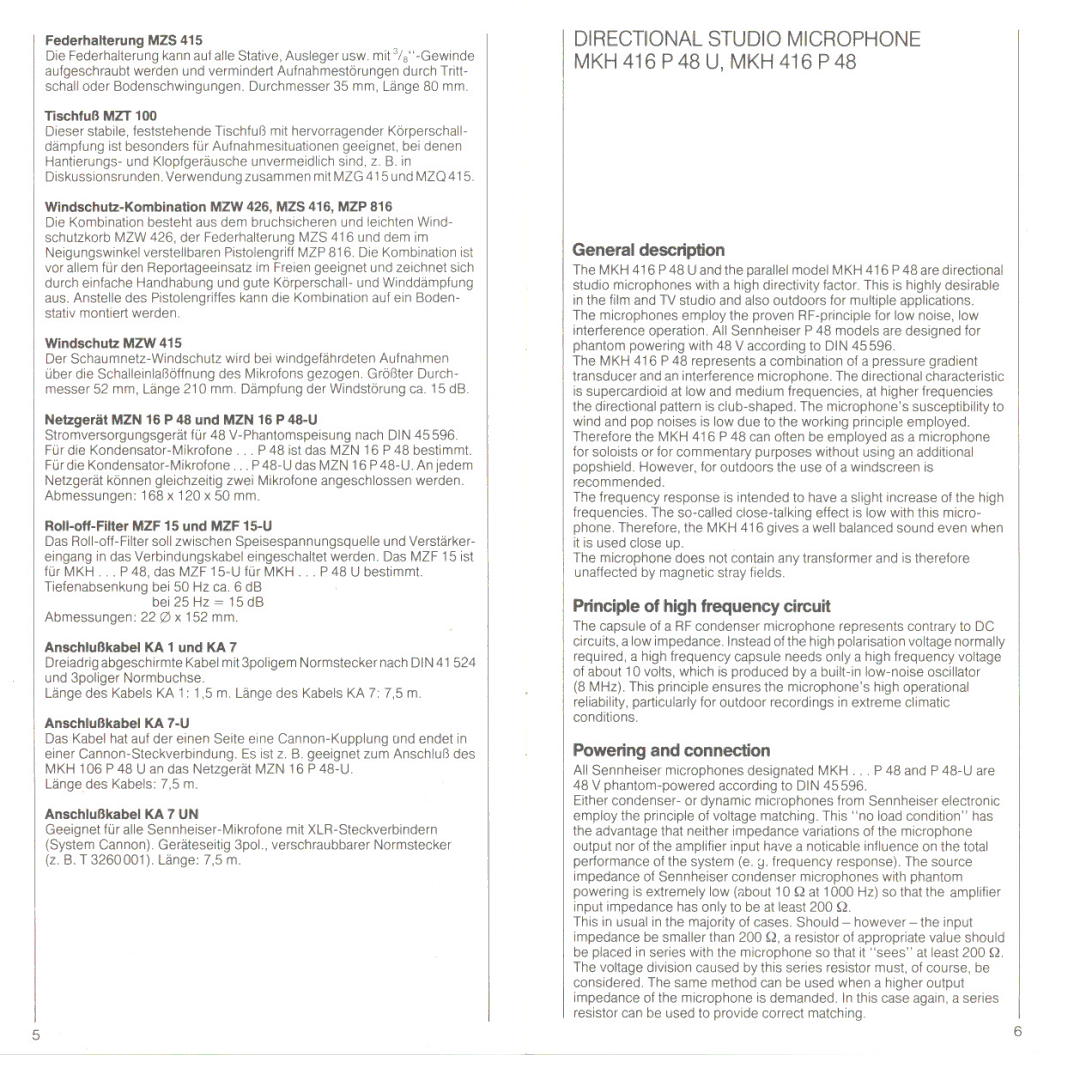Federhalterung MZS 415
Die Federhalterung kann auf alle Stative, Ausleger usw. mit 3/s"-Gewinde aufgeschraubt werden und vermindert Aufnahmestörungen durch Tritt- schall oder Bodenschwingungen. Durchmesser 35 mm, Länge 80 mm.
Tischfuß MZT 100
Dieser stabile, feststehende Tischfuß mit hervorragender Körperschall- dämpfung ist besonders für Aufnahmesituationen geeignet, bei denen Hantierungs- und Klopfgeräusche unvermeidlich sind, z. B in Diskussionsrunden. Verwendung zusammen mit MZG 415 und MZO 415.
Windschutz-Kombination MZW 426, MZS 416, MZP 816
Die Kombination besteht aus dem bruchsicheren und leichten Wind- schutzkorb MZW 426, der Federhalterung MZS 416 und dem im Neigungswinkel verstellbaren Pistolengrill MZP 816. Die Kombination ist vor allem für den Reportageeinsatz im Freien geeignet und zeichnet sich durch einfache Handhabung und gute Körperschall- und Winddämpfung aus. Anstelle des Pistolengriffes kann die Kombination auf ein Boden- stativ montiert werden.
Windschutz MZW 415
Der Schaumnetz-Windschutz wird bei windgefährdeten Aufnahmen über die Schalleinlaßöllnung des Mikrofons gezogen. Größter Durch- messer 52 mm, Länge 210 mm. Dämpfung der Windstörung ca. 15 dB
Netzgerät MZN 16 P 48 und MZN 16 P 48-U Stromversorgungsgerätfür 48 V-PhantomspeisungnachDIN 45596.
Für die Kondensator-Mikrofone. | . . P 48 ist das MZN 16 P 48 bestimmt. |
Fürdie Kondensator-Mikrofone. | .. P 48-U das MZN 16 P48-U. An jedem |
Netzgerät können gleichzeitig zwei Mikrofone angeschlossen werden. Abmessungen: 168 x 120 x 50 mm.
Roll-oft-Filter MZF 15 und MZF 15-U
Das Roll-oll-Filter soll zwischen Speisespannungsquelle und Verstärker- eingang in das Verbindungskabel eingeschaltet werden. Das MZF 15 ist für MKH . . . P 48, das MZF 15-U für MKH . . . P 48 U bestimmt.
Tiefenabsenkung bei 50 Hz ca. 6 dB bei 25 Hz = 15 dB
Abmessungen: 220 x 152 mm.
Anschlußkabel KA 1 und KA 7
Dreiadrig abgeschirmte Kabel mit3poligem Normstecker nach DIN 41 524 und 3poliger Normbuchse.
Länge des Kabels KA 1: 1,5 m. Länge des Kabels KA 7: 7,5 m.
Anschlußkabel KA 7-U
Das Kabel hat auf der einen Seite eine Cannon-Kupplung emdendet in einer Cannon-Steckverbindung. Es ist z. B. geeignet zum Anschluß des MKH 106 P 48 U an das Netzgerät MZN 16 P 48-U.
Länge des Kabels: 7,5 m.
Anschlußkabel KA 7 UN
Geeignet für alle Sennheiser-Mikrofone mit XLR-Steckverbindern (System Cannon). Geräteseitig 3pol., verschraubbarer Normstecker (z. B. T 3260001). Länge: 7,5 m.
DIRECTIONALSTUDIO MICROPHONE
MKH 416 P 48 U, MKH 416 P 48
General description
The MKH 416 P 48 U and the parallel model MKH 416 P 48 are directional studio microphones with a high directivity factor. This is highly desirable in the film and TV studio and also outdoors for multiple applications.
The microphones employ the proven RF-principle for low noise, low interference operation. All Sennheiser P 48 models are designed for phantom powering with 48 V according to DIN 45596.
The MKH 416 P 48 represents a combination of apressure gradient transducer and an interference microphone. The directional characteristic is supercardioid at low and medium frequencies, at higher frequencies the directional pattern is club-shaped. The microphone's susceptibility to wind and pop noises is low due to the working principle employed. Therefore the MKH 416 P 48 can olten be employed as a microphone for soloists or for commentary purposes without using an additional
popshield. However, for outdoors the use of a windscr'eenis recommended.
The frequency response is intended to have a slight increase of the high frequencies. The so-called close-talking ellect is low with this micro- phone. Therefore, the MKH 416 gives a weil balanced sound even when it is used close up.
The microphone does not contain any transformer and is therefore unaffected by magnetic stray fields.
Principle of high frequency circuit
The capsule of a RF condenser microphone represents contrary to DC circuits, a low impedance. Instead of the high polarisation voltage normally required, a high frequency capsule needs only a high frequency voltage of about 10 volts, which is produced by a built-in low-noise oscillator
(8 MHz). This principle ensures the microphone's high operational
reliability, particularly for outdoor recordings in extreme climatic conditions.
Powering and connection
All Sennheiser microphones designated MKH . . . P 48 and P 48-U are 48 V phantom-powered according to DIN 45596.
Either condenser- or dynamic microphones from Sennheiser electronic employ the principle of voltage matching. This "no load condition" has the advantage that neither impedance variations of the microphone output nor of the amplifier input h;:l'Jea noticable influence on the total performance of the system (e. g. frequency response). The source impedance of Sennheiser condenser microphones with phantom powering is extremely low (ilbout 10 Q at 1000 Hz) so that the amplifier input impedance has only to be at least 200 Q.
This in usual in the majority of cases. Should - however - the input impedance be smaller than 200 Q, a resistor of appropriate value should be placed in series with the microphone so that it "sees" at least 200 Q. The voltage division caused by this series resistor must, of course, be considered. The same method can be used when a higher output impedance of the microphone is demanded. In this case again, aseries resistor can be used to provide correct matching.

